Rainforest World Music Festival
The Rainforest World Music Festival (often abbreviated as RWMF) is an annual three-day music festival celebrating the diversity of world music, held in Kuching, Sarawak, Malaysia, with daytime music workshops, cultural displays, craft displays, food stalls, and main-stage evening concerts. The festival has been awarded 25 of the best International Festivals by Songlines for six consecutive years; from 2010 to 2015.[3]
| Rainforest World Music Festival | |
|---|---|
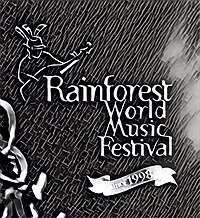 | |
| Status | Active |
| Genre | Music Festivals |
| Frequency | Annually |
| Venue | Sarawak Cultural Village |
| Location(s) | Kuching, Sarawak, Malaysia |
| Coordinates | |
| Country | Malaysia |
| Years active | 1998 - Present |
| Most recent | 12 - 14 July 2019 |
| Next event | 10 - 12 July 2020[1] |
| Attendance | 23,650 (2019)[1] |
| Budget | RM 4 million (unofficial figures, 2018)[2] |
| Organised by | Sarawak Tourism Board |
The festival features a wide range of performances from traditional music, to world fusion and contemporary world music. The festival emphasizes the use of traditional acoustic world instruments, although electric accompaniment instruments are common.
History
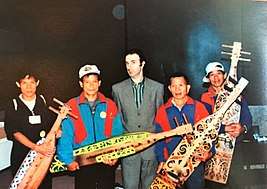
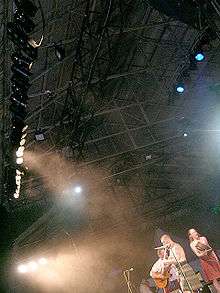

Back in 1997, a Canadian musicologist named Randy Raine-Reusch visited Robert Basiuk, who was Deputy Chief Executive Officer of the Sarawak Tourism Board then. Randy was researching ethnic music and was particularly interested in the Sape, played mainly by the Kayan and Kenyah people of Sarawak.[4] During their meetings, they discussed a possibility of Sarawak having an annual music festival along the lines other festivals in the world.[4]
At a dinner one night in 1997 at the home of Edgar Ong, together with Edric his brother who was the President of Society Atelier, suggestions for a catchy name to call the music festival arose. It was Edgar who finally proposed the Rainforest World Music Festival, and thus it was agreed to by all present.
To test the idea, a group of local musicians were formed to take Sarawak music to the world stage at the World Music Expo (WOMEX) festival in Marseilles, France.
"I had an invitation from WOMEX in Marseilles to bring some traditional musicians, so I suggested to Bob, and the Tourism Board, that we should send some musicians there to promote Sarawak." - Randy Raine-Reusch[5]
With the help of Jayl Langub from Majlis Adat Istiadat (Native Customary Laws Authority), two sape players, Asang Lawai and Tegit Usat were brought to Kuching from upper stretches of Balui River in Belaga and was join by Erang Lahang and Uchau Bilong.[5][6] They rehearsed with Randy for a week in Kuching and left for Marseilles to perform at the WOMEX festival. Hardened European agents, managers and festival directors were brought to tears at the beauty and purity of their performance on the sape.[5][7]
Upon returning to Sarawak after WOMEX, Randy and Robert attended a meeting with Datin Julia Chong, representatives of Sarawak Music Society and committee members of a cultural association called Society Atelier Sarawak.[5] The Sarawak Music Society was approached to run the show, but found it beyond their scope. The members of Society Atelier Sarawak, and particularly its president Edric Ong, gave a lot of logistic support to the undertaking. But it was the Sarawak Tourism Board who undertook the task of consolidating and financing the event.[5]
In March 1998, the Tourism Board approved the funding for the festival, but with the provision that the organiser be the Sarawak Tourism Board. The Society Atelier Sarawak was to take the role of technical support in terms of the music and Randy was appointed as the main consultant for the event.[4] By this time, the rest of Sarawak Tourism Board staff were being conscripted in to assist with the organization and running of the festival; behind-the-scenes roles they took on and have continued to fill until the present day.[4]
The crowd in the first year was small with an audience of only 300, but soon escalated to become one of the most awaited musical fiestas that Sarawak proudly hosts each year.[8]
Dates of the Festival
The dates of the festival held since 2005:
| Year | Date | Attendance |
|---|---|---|
| 2005 | 8–10 July 2005 | N/A |
| 2006 | 7–9 July 2006 | 20,000[9] |
| 2007 | 13–15 July 2007 | N/A |
| 2008 | 11–13 July 2008 | 22,000[10] |
| 2009 | 5–7 July 2020 | 22,000 |
| 2010 | 9–11 July 2010 | 22,000[11] |
| 2011 | 8–10 July 2011 | N/A |
| 2012 | 13–15 July 2012 | N/A |
| 2013 | 28–30 June 2013 | 22,390[12] |
| 2014 | 20–22 June 2014 | 22,000[13] |
| 2015 | 7–9 August 2015 | 18,000[14] |
| 2016 | 5–7 August 2016 | 18,000[15] |
| 2017 | 14–16 July 2017[16] | 19,440[16] |
| 2018 | 13–15 July 2018[17] | 22,000[18] |
| 2019 | 12–14 July 2019 | 23,650[1] |
Features
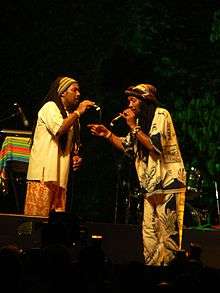
The festival is held in the grounds of the Sarawak Cultural Village nestled against the base of Mount Santubong, about 35 km. north of Kuching. The festival runs workshops (mini concerts) in the afternoon followed by evening performances held on the two main stages in the village. The festival usually features from 18 to 20 bands through the weekend.
Invited performers come from Sarawak, other provinces of Malaysia, and countries near and far. Festival acts have included: Joey Ayala (Philippines, 1998), Shooglenifty (Scotland, 1999), Inka Marka (South America, 2000), Rajery (Madagascar, 2001), Black Umfolosi (Zimbabwe, 2002), Huun Huur Tu (Tuva), Cynthia Alexander (Philippines), 2003), Te Vaka (Samoa/New Zealand, 2004), Namgar (Mongolia, 2005), Shannon (Poland, 2005, 2007), Peatbog Faeries (Scotland, 2006), Tarika Be (Madagascar, 2007), Ross Daly (Greece, 2008) and Blackbeard's Tea Party (England, 2014).[19]
The atmosphere is very relaxed. Although there are timetables for the workshops and evening performances, visitors are free to enter and leave any event at will. The daytime workshops are held inside various traditional houses in the village, where the performers and leaders of the events are often on the same floor-level as the audience, allowing them to get up close to the performers. There are also no restrictions in communicating with the performers, and the musicians themselves sometimes encourage conversation, especially if it is regarding the topic of the workshop they are running or about the traditional instruments they use. Artists are also not hidden behind barriers at the festival and can seen walking through the site throughout the duration, allowing the audience access to them at any time.
Awards and recognition
- Winner of the Heritage & Culture PATA Gold Award 2006[20]
- ASEANTA Excellence Award 2009 -Best Asean Marketing and Promotional Campaign[21]
- 2012 Hospitality Sales and Marketing Association International (HSMAI) Silver Adrian Award (for 'Re-imaging' campaign).[22]
- The BrandLaureate Country Branding Award 2012–2013.[23]
- Top 25 Best International Festivals by the magazine Songlines(2010-2015)[3][24]
- 2016 Hospitality Sales and Marketing Association International (HSMAI) Silver Adrian Award in "Special Event" category.[25]
- 2016 Communications Director Asia-Pacific Excellence Award in the "Event & Experiential Marketing" category.[26]
- 2018 Transglobal World Music Chart (TWMC) Festival Awards in the "Global Top 10" category (ranked 8th).[27]
- 2019 Transglobal World Music Chart (TWMC) Festival Awards in the "Global Top 10" category (ranked 8th).[28]
Food and drinks
A variety of food stalls throughout the site feature a variety of local and regional Malaysian cuisine and other Asian cuisine. Although alcohol was available freely for some years, the festival has taken steps to control its availability due to some official complaints. Beers are now provided by official suppliers in a number of venues throughout the Festival. This has been met with mixed reviews from Festival goers.
Security
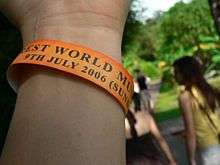
During the 2007 festival there was a notable increase in security in and around the festival to prevent people from entering with forged tickets or causing trouble. At the entrance visitors must present their tickets and then be given an official wristband which has a security UV strip.
Metal detectors are also used to scan each visitor and backpacks and bags must be presented to the staff at the front gate to be searched. New to the additional security were guard dogs around the cultural village used to discourage the smuggling of drugs and narcotics into the festival.
Into the future
The Rainforest World Music Festival seems to be experiencing some growing pains, as it is clearly reaching the limit of its site. The festival was sold out two of the three nights in 2008, and many frustrated fans were turned away at the gate. Hotels in the region are receiving bookings a year in advance, but fortunately local guest houses are becoming more common. Although there is bus transportation to and from the site, many locals still insist on driving their own cars and end up becoming irritated with the lack of parking. Nevertheless, the festival continues to grow and attract audiences from around the world.
References
| Wikimedia Commons has media related to Rainforest World Music Festival. |
- Jacqueline David (17 July 2019). "RWMF hits biggest number of visitors this year — Karim". The Borneo Post. Retrieved 17 July 2019.
- The Rainforest World Music Festival comes of age, The Borneo Post. 14 July 2018.
- Rainforest World Music Festival 2016, Sarawak Tourism Board. 15 April 2016.
- 20th Rainforest World Music Festival Programme Book. Sarawak, Malaysia: Sarawak Tourism Board. 2017. pp. 7–8.
- Munan, Heidi (2007). Music Without Borders; The Rainforest World Music Festival in Sarawak. Malaysia: Marshall Cavendish. pp. 36–39. ISBN 978 9833 845 14 9.
- White, Mimi (2006). The Questions of Method in Cultural Studies. Oxford, UK: Blackwell Publishing. pp. 257. ISBN 9780631229773.
- "Master Of The Sape – This Is How It All Begin - Rainforest World Music Festival". Rainforest World Music Festival. Sarawak Tourism Board. 5 July 2011. Retrieved 5 August 2017.
- "Ask An Insider: What It Takes To Organise The Rainforest World Music Festival". Malaysia Tatler. Retrieved 5 August 2017.
- 8th Sarawak Rainforest World Music Festival Archived 13 January 2006 at the Wayback Machine, MTV Asia. 19 April 2011.
- More delights for rainforest music fest fans Archived 3 June 2012 at the Wayback Machine, The Star. 19 April 2011.
- Rainforest World Music Festival has reached a plateau, say experts Archived 17 October 2012 at the Wayback Machine, The Star. 19 April 2011.
- Music festival racks in RM37mil More than 20,000 come to the event, another success story for state and organiser, The Star. 1 August 2013.
- Unique Rainforest Festival will feature renowned international and indigenous musicians, The Star. 3 August 2015.
- Rainforest World Music Festival 2016 from Aug 5 to 7, The Borneo Post. 20 October 2015.
- A journey around the world: 5 highlights from the Rainforest World Music Festival 2016, Asia One. 26 August 2016.
- Ticket sales up by 8 per cent for this year’s RWMF, The Borneo Post. 23 April 2018.
- AirAsia partners Sarawak tourism board for upcoming music festivals, The Sun Daily. 23 April 2018.
- ‘RWMF is here to stay’, The Borneo Post. 29 May 2019.
- "Rainforest World Music Festival". asiaexplorers.com. Archived from the original on 18 September 2011. Retrieved 28 January 2015.
- Rainforest World Music Festival Archived 22 July 2011 at the Wayback Machine, Sarawak Tourism. 19 April 2011.
- Sarawak Tourism Board secures Aseanta award, The Star. 7 January 2009.
- STB wins award for re-imaging campaign, The Borneo Post. 31 January 2013.
- Rainforest World Music Festival receives BrandLaureate Country Branding award, The Borneo Post. 31 May 2013.
- RWMF among 25 top festivals Archived 17 October 2012 at the Wayback Machine, The Star. 19 April 2011.
- HSMAI 2016 Adrian Awards Dinner Reception & Gala, Adrian Awards. 23 April 2018.
- "RWMF wins Asia-Pacific Excellence Award". The Borneo Post. Retrieved 23 April 2018.
- "TWMC Festival Awards: 2018 results". TransglobalWMC.com. Retrieved 11 March 2019.
- "RWMF still ranks 8th in TWMC Festival Awards". The Borneo Post. 4 February 2020. Retrieved 4 February 2020.